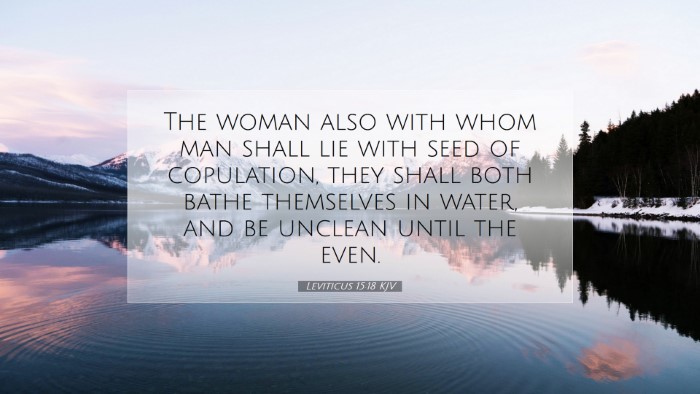Commentary on Leviticus 15:18
Bible Verse: "The woman with whom a man lays seed of copulation, they shall both bathe in water, and be unclean until the evening." (Leviticus 15:18, NKJV)
Overview
The laws outlined in Leviticus, particularly in chapter 15, concern matters of ceremonial cleanliness and purity. This section provides valuable insights into the sanctity of sexual relations and the importance of ritual purity for the Israelites.
The Nature of Uncleanness
The text emphasizes that both parties involved in the act of copulation become ceremonially unclean. According to Matthew Henry's Commentary, this law reflects God's concern for holiness among His people and serves as a reminder that even natural processes, such as sexual relations, carry with them a dimension of ceremonial respect and purity.
Adam Clarke's Commentary elaborates on this notion by indicating that spiritual uncleanness could arise from habitual or careless attitudes toward sexual relations, showing that God desires His people to approach such acts with an awareness of their sacredness.
The Importance of Cleansing
Both parties are instructed to bathe in water, highlighting the necessity of cleansing following sexual relations. As Albert Barnes’ Notes on the Bible put it, bathing symbolizes the restoration of purity and acknowledges that the act, while natural, had implications for spiritual cleanliness.
- Symbolic Cleansing: The act of bathing is not just physical but has a symbolic representation of spiritual renewal.
- Evening Purity: Being unclean until evening indicates a period of separation from sacred responsibilities and community life.
God’s Design for Human Relationships
The inclusion of ceremonial laws regarding sexual relations underscores God's design for human relationships, where purity in conduct reflects deeper spiritual truths. Matthew Henry stresses that these regulations foster respect for one another and the sacredness of marital intimacy.
Furthermore, Adam Clarke notes that such laws served to safeguard the marital union from becoming commonplace and trivialized, thus ensuring that the covenantal relationship between a man and a woman is treated with honor.
The Broader Implications of Purity Laws
Leviticus 15:18 forms part of a broader legal framework that promoted societal health. Albert Barnes observes that public health in ancient Israel was interlinked with spiritual health, and ceremonies of purification after sexual relations served as reminders of personal accountability in community life.
- Community Impact: The regulations strengthened the moral fabric of society and encouraged communal disciplines that would protect the people from spiritual decline.
- Holiness unto the Lord: Such laws demanded a continual recognition of God’s holiness and the call for His people to reflect that holiness in their daily lives.
Theological Insights
This verse provides rich theological insights into how God structured human intimacy within the context of worship and holiness. Matthew Henry articulates that the general principle of God’s holiness requires that His people maintain purity in all aspects of their lives, including private matters such as sexual conduct.
The phrase "unclean until evening" indicates temporal limitations to this state of uncleanness. The cleansed state reinstates an individual’s qualification to participate fully in communal worship, which Albert Barnes argues is essential for understanding the full scope of the relationship between personal purity and corporate worship.
Conclusion
In summary, Leviticus 15:18 serves as a crucial reminder of the sacredness of sexual relationships within the larger context of living a life marked by holiness and awareness of the presence of God. For pastors, scholars, and students, the implications drawn from this text challenge believers to uphold the sanctity of human relationships, ensuring that all aspects of life are conducted within the parameters of divine holiness and reverence.
As communities today grapple with issues of morality and spiritual integrity, the insights drawn from this law encourage a return to principles that honor God in our most intimate expressions and interactions, thus fostering a culture of purity that reflects His glory.


